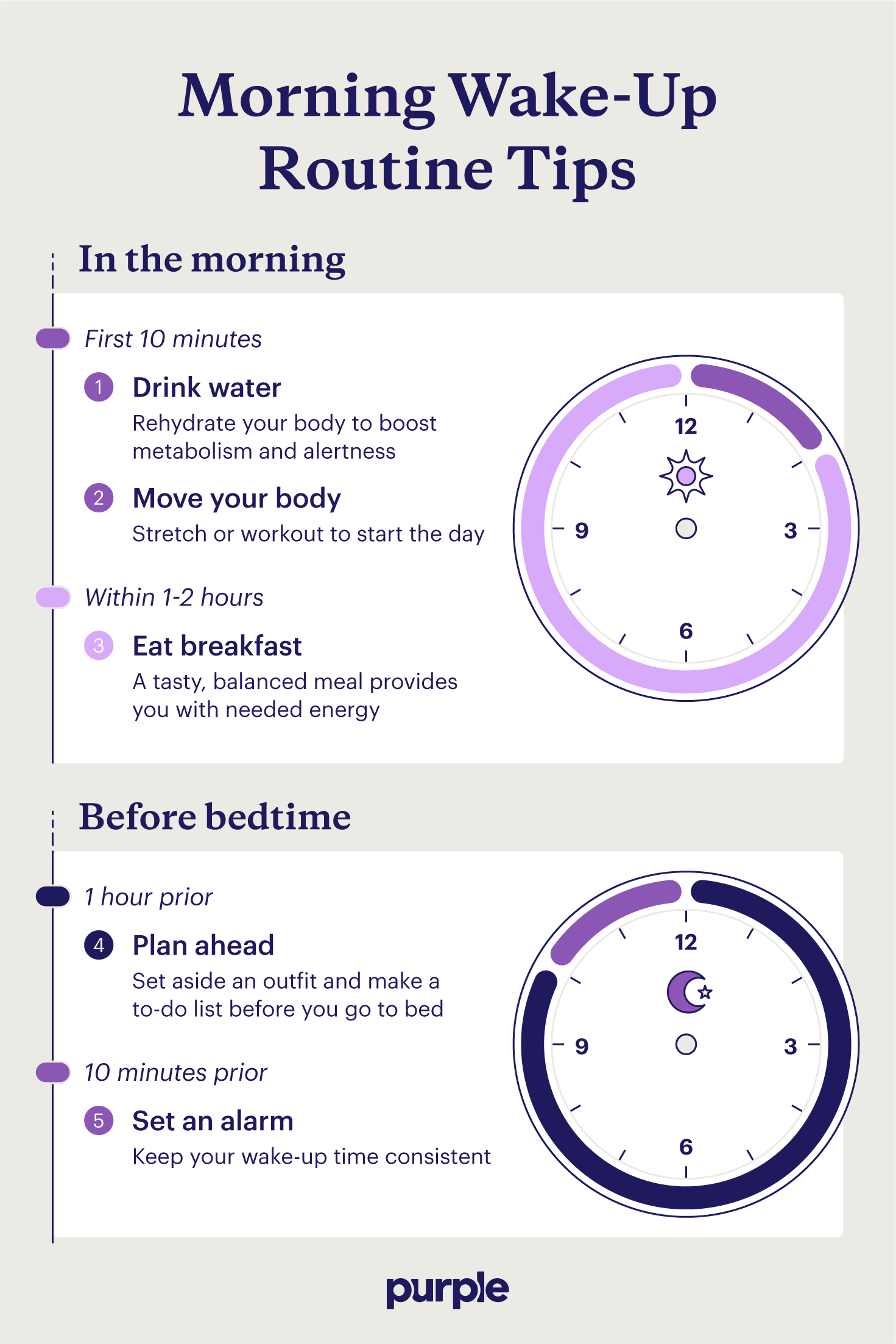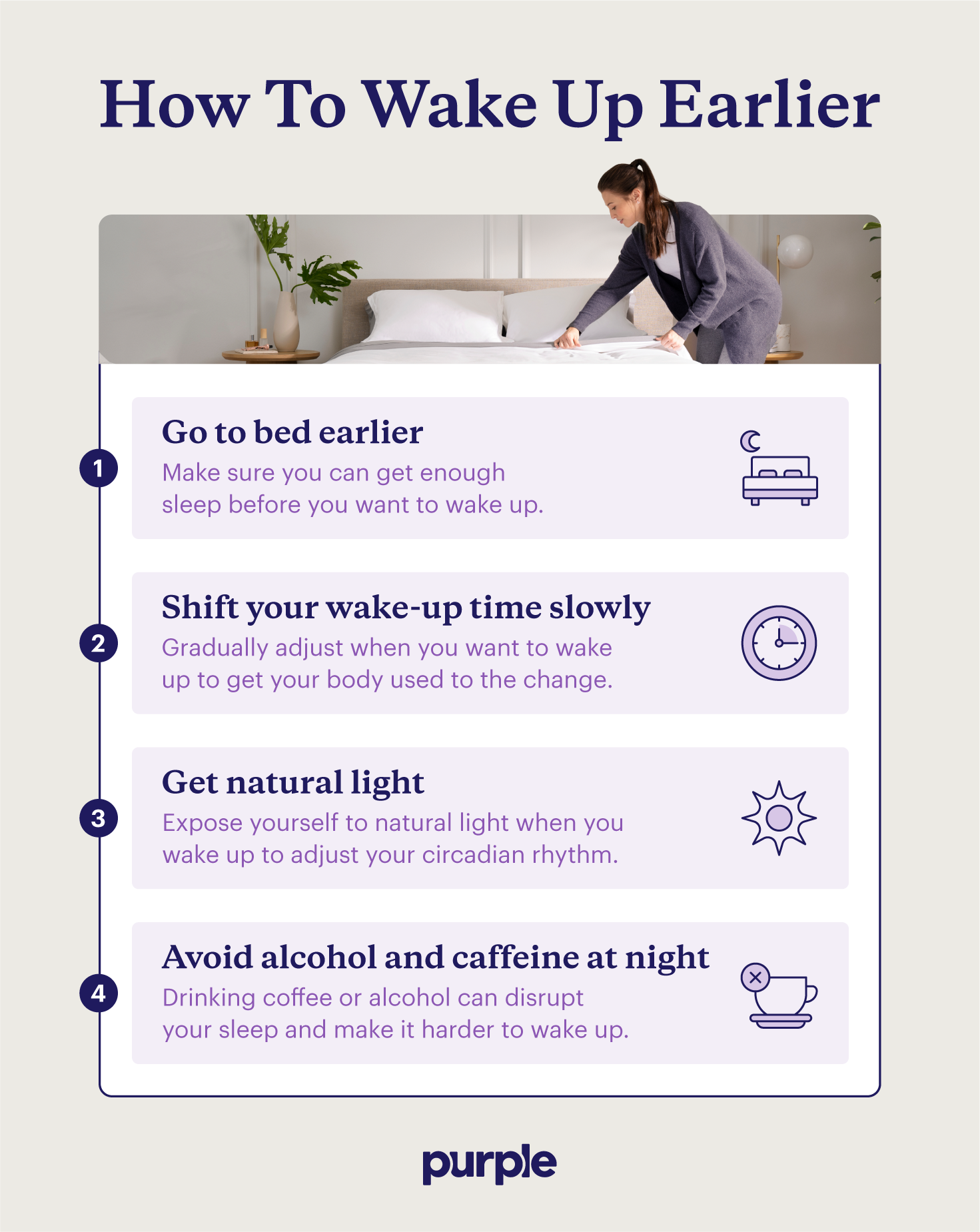
How To Wake Yourself Up Easier + Naturally: 19 Ways
Key Takeaways
- Wake yourself up by establishing a consistent sleep schedule, embracing natural light, eating a healthy breakfast, and incorporating enjoyable morning rituals.
- You may have trouble waking up due to disrupted sleep cycles, poor sleep quality, or not getting enough sleep. Recognizing these factors can guide you to improve your mornings.
Waking up in the morning can feel like a daunting task. If you don’t know how to wake yourself up properly, you might find yourself hitting snooze repeatedly or even waking up with a headache. This common struggle can stem from poor rest quality, stress, or disrupted sleep cycles.
However, it’s an important issue to address since most adults need at least 7 hours of sleep to function.1 Getting sufficient rest can enhance your mental clarity and make your body resilient against various diseases.2
At Purple, we understand the importance of quality sleep. That's why we're committed to not only offering you high-quality pillows and mattresses but also sharing expert advice on how to kickstart your day the right way. Read along to learn some interesting sleep facts and discover the most effective ways to wake up in the morning.
1. Outsmart Your Snooze Button
It’s way too easy to hit the snooze button multiple times if your alarm clock sits right next to you on your bedside table. But if you move that alarm clock across the room, it’s not so easy.
This simple change means you’ll have to physically get out of bed to turn off its annoying buzzing or beeping, which makes it more likely that you'll stay up. It’s a small but effective strategy to combat oversleeping and help you get up at the same time each day.
2. Embrace Natural Light
One of the best ways to wake up is by embracing the natural morning light. The faster you can let in the light, the better off you’ll be. Open the blinds, turn on the lights, or step outside if possible—even a short walk in the morning sun can do wonders. You might even think about sleeping with your blinds open so the morning sun can help wake you up.
Light and sleep have an interesting link. Light gets your brain going and can help encourage your circadian rhythm to stay on track.3 Some people find a sun lamp helpful, especially during the gray winter months. It can help you feel more awake and improve your overall mood. Embracing light is a great way to drive out the morning blues.
3. Start With a Morning Workout
Learn how to wake up easier with a quick morning workout to get your blood flowing, and regulate your body temperatures.4 A few jumping jacks or a brisk walk around the neighborhood is often enough to help you feel wide awake.
People who work out in the morning usually have less trouble falling asleep at night, as exercise helps regulate the body's circadian rhythms and promotes the release of sleep-inducing hormones like melatonin. This, in turn, helps make waking up in the morning even easier.
If you want to learn how to be energized in the morning, a quick exercise session is the answer. Morning exercise can boost your energy for several hours afterward. So you can say goodbye to the dreadful mid-morning slump. Your workout doesn’t have to be intense either. Even a round of stretching can make you feel more awake and ready to face the day.
4. Find Your Morning Motivation
It’s easy for the mornings to become an unpleasant scramble as you prepare for your day. But if you can fit in time for a small treat, that’s a great incentive to get up and out of bed. Find something you genuinely enjoy that you can include in your morning routine. Take a leisurely walk, indulge in a delicious breakfast, or spend a few quiet moments reading your favorite book.
Some morning risers even enjoy cranking up their favorite tunes and having a dance party first thing—try it and see if it doesn’t put you in a good mood! Lighting a scented candle or diffusing an energizing essential oil can also turn those initial minutes of wakefulness into a pampered experience. Learning how to wake yourself up can be as simple as incorporating these enjoyable rituals into your mornings.
5. Eat a Balanced Breakfast
Waking up in the morning can feel daunting, but starting your day with a balanced breakfast can be a powerful catalyst for getting out of bed. Eating can stimulate metabolism and prompt your body to transition from sleep to wakefulness.
Try keeping a quick, nutritious breakfast option on hand, such as a protein-packed smoothie. You can even visualize preparing your breakfast to create a sense of excitement that makes getting out of bed more appealing.
Opt for breakfast foods rich in protein and whole grains. Try scrambled eggs with whole-grain toast or Greek yogurt topped with fresh fruit. These foods signal your brain that it's time to be alert, help regulate your blood sugar, improve heart health, and boost your immunity.5 Remember, what you eat before bed also impacts your sleep quality. So be mindful of those late-night choices!
6. Get the Right Amount of Sleep
Understanding your sleep needs is crucial for figuring out how to wake yourself up effectively. Most adults need 7 to 9 hours of sleep per night, but individual needs may vary by age and lifestyle.6
You can use a sleep calculator to identify your ideal sleep duration. Once you discover the ideal sleep duration, count backward from your desired wake-up time to establish a bedtime that works for you.
7. Drink Caffeine
Whether it’s coffee, tea, or an energy drink, there’s no denying that caffeine can be quite effective in waking you up. Not only does caffeine block your brain’s adenosine receptors, which helps prevent your sleep drive from increasing, but it can also enhance your serotonin and dopamine levels.7 As a result, you're likely to feel more energetic, focused, and uplifted after that cup of coffee.
If you’re wondering how to wake yourself up quickly, caffeine is often the go-to solution for many morning warriors. Be careful though, caffeine can only do so much, especially if you’re severely sleep-deprived. Too much can lead to a caffeine crash, making you feel even more tired and irritable, ultimately reversing any benefits.
8. Drink water
Hydration is key to waking up feeling energized. Start your morning by drinking a glass of water to rehydrate your body after hours of sleep. Mild dehydration can negatively impact your concentration and alertness, making it harder to shake off that morning grogginess.8
Consider pairing your water intake with a refreshing cold shower. The sudden temperature change can help stimulate your senses, increase your heart rate, and boost your overall alertness.
9. Take Power Naps
Sometimes, there’s just no getting around it—you need more sleep! If you’re still waking up feeling groggy, a few extra minutes can help shake off the sleep inertia keeping you in bed.
But there is a time of day that can make you tired and sleepy: the afternoon dip. This daytime sleepiness usually occurs in the afternoon, making it the ideal time to nap. A 10 to 20-minute power nap can recharge your batteries and give you a boost for the rest of the day.9
Research from NASA has shown that pilots who napped for about 26 minutes experienced improved alertness and overall performance.10 So, if you’re wondering how to wake yourself up when tired, a quick nap might be the solution.
10. Skip Late Day Caffeine
Caffeine can be a great pick-me-up, but consuming it in the afternoon can interfere with your ability to fall asleep or stay asleep all night. When caffeine is in your system, it can block adenosine, a brain chemical that promotes sleepiness.
This disruption makes it harder to fall asleep at night, resulting in grogginess when you wake up the next morning.11 If you want to know how to wake yourself up refreshed, ensure you avoid caffeine in the late afternoon for a restorative night of sleep. As time passes, your body might even learn how to wake up without caffeine.
11. Maintain a Consistent Sleep Schedule
For those wondering how to wake up in the morning without feeling groggy, a consistent sleep schedule is the key! It helps regulate the release of hormones like melatonin, which signal your body when it's time to sleep and wake.12
To fix your sleep schedule, aim for regular bedtimes and wake times each day – even on the weekends. If you sleep in on Saturday without setting an alarm, your body can revert to its natural circadian rhythm and cause a phase delay. It’s no surprise that phase delay is pretty common among those who work shift-related jobs, which includes up to 25 percent of the U.S. population.13
12. Use the Right Pillow and Mattress
If you are still tired upon waking, choosing the right mattress, sheets, and pillows can turn your bedroom into a sleep haven. High-quality bedding helps alleviate pressure points and supports your body's natural alignment. Additionally, soft, breathable materials enhance comfort, reducing disturbances that can interrupt your rest.
On the other hand, an uncomfortable mattress or unsupportive pillow is a recipe for a gnarly and non-restorative night’s sleep. It’s a good idea to evaluate your mattress every few years. If your current mattress isn’t giving you the support and comfort you need, it may be time to consider an upgrade. A new Purple mattress can revolutionize your rest, helping you bid farewell to groggy mornings and embrace energized days.
13. Avoid Heavy Meals Before Bed
Eating heavy meals before bed can disrupt your ability to fall and stay asleep. When you indulge in a late-night feast, your body diverts energy to digestion, making it harder for you to wind down.14
This overeating can lead to discomfort and fragmented sleep. Try to finish eating at least two to four hours before bedtime for a better rest. Grab a light snack with sleep-promoting foods like almonds or bananas if you're hungry. Avoid heavy meals, caffeine, and sugary snacks that can disrupt your sleep cycle.
14. Create a Nighttime Routine
Establishing a nighttime routine can work wonders for your ability to fall asleep fast. Calming activities—like reading, meditating, or mild stretching—signal your body that it's time to wind down. By learning how to wake yourself up through better sleep preparation, mornings can become a breeze.
With a healthy bedtime routine, you'll set yourself up for better quality rest, a more consistent sleep schedule, and an eaasier start to your mornings.
15. Limit Alcohol Consumption
Learning how to force yourself to wake up can be challenging if you have a habit of drinking alcohol before bed. Drinking alcohol within two hours of bedtime can make it harder to stay asleep or achieve REM sleep, which is the deepest and most restorative kind of sleep.15 Additionally, consuming alcohol can lead to restless sleep, causing frequent awakenings throughout the night.
It may also make it harder to wake up the next morning since it can make you feel groggy, dehydrated, and out of sorts. One drink with dinner shouldn’t hurt, but be careful not to overdo it, or you’ll disrupt your sleep schedule.
16. Reduce Screen Usage Before Bed
Your screen’s blue light might be keeping you up at night. This light can disrupt melatonin production and make it harder to drift off.16 To promote better sleep and learn how to wake yourself up in the morning with energy, try to avoid screens for at least an hour before bedtime.
17. Keep Your Room Dark and Cool
Your sleep environment plays a crucial role in the quality of your rest. A dark and cool room promotes deeper sleep. Cooler atmospheres drop your body's core temperature while dark environments encourage melatonin production.17
Maintaining what experts consider the best temperature for sleep, around 60 to 67 degrees Fahrenheit (15-19°C), can help you fall asleep more efficiently and wake up refreshed.
18. Use Melatonin
Melatonin is a brain chemical that can help keep your body’s internal clock on the right path. An increase in melatonin is a key signal for your body that it’s time to wind down and sleep.18
If you find yourself off-schedule due to travel or ongoing sleep issues and wondering how to wake yourself up effectively, a small dose of non-addictive sleep aids like melatonin might be just what you need to get your rhythm back. Talk to your doctor to find out if melatonin supplements can help you maintain a regular sleep schedule.
19. Consult Your Doctor
If you’re too stressed to sleep or consistently struggle to wake up feeling rested despite following good sleep practices, it may be time to consult your physician.
Ongoing sleep issues could indicate underlying health problems that need attention. Your physician can help identify any potential sleep disorders and provide personalized tips on how to wake yourself up when tired.
Improve Your Sleep Quality With Purple
Now that you know how to wake yourself up, consider investing in a Purple mattress to sleep better than ever. Our innovative GelFlex Grid technology cradles your body in all the right places, providing the necessary support and comfort for a rejuvenating night’s rest. In a SleepScore Labs study, participants reported over 3x improvement in sleep satisfaction19 after sleeping on a Purple Restore collection mattress compared to their original mattress.
With the right combination of a Purple mattress and our premium pillows and bedding, you’ll feel refreshed and ready to tackle your day. Explore our selection today and discover the difference Purple can make in your sleep quality.
FAQ
If you’re wondering how to wake yourself up when tired at work or school, try incorporating light and movement into your morning routine. Open your curtains to let in natural light, and consider doing some quick stretches or light exercises. This combination can help kickstart your body and mind, making it easier to feel alert.
Learning how to wake up without caffeine can be achieved by focusing on hydration and natural light. Start your day with a glass of water to rehydrate and boost your energy. Expose yourself to natural sunlight to regulate your circadian rhythm and promote wakefulness.
If you want to know how to stop feeling sleepy in the morning, you must establish a consistent sleep schedule. Aim for 7-9 hours of restful sleep each night and wake up at the same time each day, even on weekends. Pair this with a balanced breakfast to fuel your body and regulate your internal clock.
The 4 AM Rule suggests waking up early, typically around 4 AM, to seize the day. This approach emphasizes quiet time for personal development, planning, or exercise before the world wakes up. By implementing this rule, you’ll discover how to wake yourself up with intention and set a positive tone for the day.
More To Explore
Level up your sleep routine with our most-loved products.













